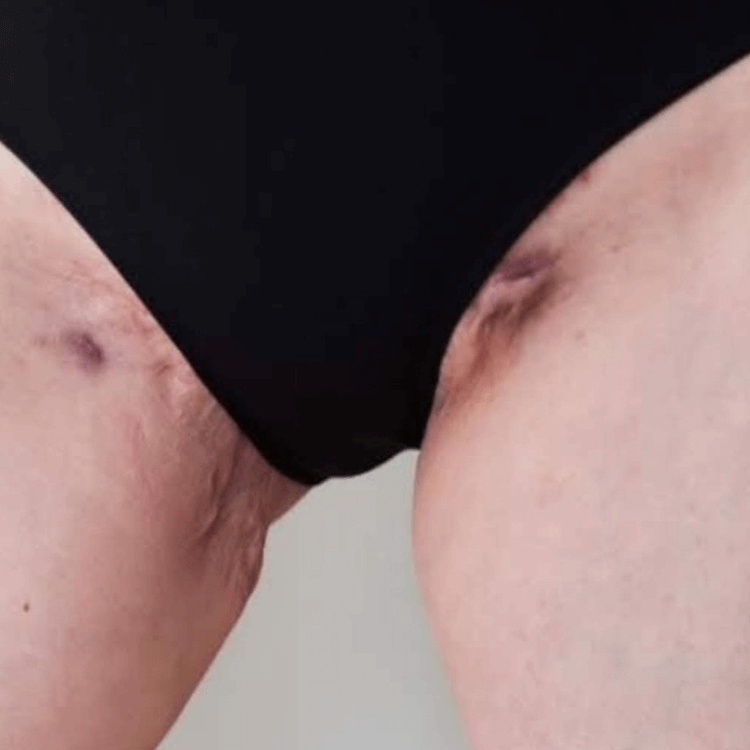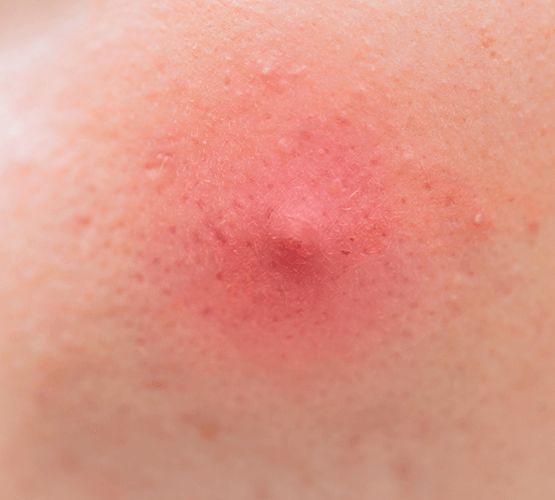ALSO AVAILABLE THROUGH INSURANCE
What Causes HS?
What Causes HS?
The honest answer is, unfortunately nobody knows. However, this area of research is growing, and doctors and researchers are getting closer to finding an answer.
A lot of people feel shame about having HS. It is not your fault, and there is nothing to be ashamed about. It is just another medical condition. It is important to remember that when you go to see the doctor. You have the right to be treated for your illness, without stigma or feeling shame.
Their job is to help you, and a good doctor will be able to do that. If you are unsure or uncomfortable about the way you are being treated by your doctor, it might be time to find a dermatologist who specialises in HS.

There are a lot of great doctors out there, and they can help you. It is a complicated question because there are so many factors involved. But let’s start with what does not cause HS, because it is so important that you know that having HS is not your fault, no matter what you have been told previously.
Poor Hygiene
HS is not caused by poor hygiene. This is one of the most brutal things that may have been said to you. And if you have been told that before, I am sorry you had to experience that, and it might be time to see a new doctor.
Obesity & Smoking
Being overweight or smoking did not cause your HS. They may be a contributing factor or a trigger to your HS, and you may be able to reduce symptoms by quitting. Either way, if you want to give your body the best chance of healing and recovery, it might be the right time to take action if you feel you want to. You are in control of what goes into your body, and it might be time to take back that control and use it to benefit your health.
HS is not contagious
HS is not contagious or sexually transmitted. It is so important to understand that. You did not catch this, and you cannot spread it.
Products
You have not caused this by using a certain product or shaving/waxing your body hair.
So, what are the suspected causes of hidradenitis suppurativa?
There seem to be lots of different potential causes and contributing factors:
Inflammation
Inflammation is the body’s response to an irritant. This irritant is usually a bacteria, or maybe a bee sting or a mosquito bite. It might be a chemical agent, or a burn, or it could be pollen. Your body is equipped to deal with a lot, and to protect you from harm. Your immune system is amazing, and when it is working correctly inflammation protects you from harm and helps you to heal.
Different organs and glands in your body produce immune cells. And different immune cells have different jobs to do when fighting an irritant. When damage occurs to your body, special cells sound the alarm, and signal to other cells that help is needed. It is a complex and incredible sequence of signals, cell production and destruction, and so much more! It is like a mini battle going on inside your body.
A normal immune response will cause inflammation, which will subside when the threat is resolved, and the battle is over. But in HS, for some reason, there is a malfunction in the immune system, which means we can get stuck in this inflammatory process. The immune cells are not behaving the way they should be, and they can start to damage our body. It’s not fully understood what may cause the inflammation to begin, or why it gets out of control.
There are things that we know for sure can cause inflammation in the body, this may not be the direct cause of the HS but may be a contributing factor. Things like smoking, sugar, unhealthy fats, exposure to chemicals, and even sleep deprivation can cause inflammation. Even if these are not contributing factors or triggers for our HS, it is better to avoid these irritants for your overall health and wellbeing.
Some people find that eating an anti-inflammatory diet helps them with their HS symptoms, and others have noticed a difference when they quit smoking. Some people have been able to identify triggers that cause inflammation in their body and try to avoid them. Keeping a symptom diary could be helpful for tracking your HS flares and if you can see any patterns emerge.
Follicular Occlusion
This is a fancy term for blocked hair follicles. A hair follicle is a tiny tunnel shaped structure in your skin that your hairs grow from. Even though the hair follicle is teeny tiny, don’t underestimate it. There are lots of different cell types in each follicle, each with its own job to do. It is a complex structure with lots of even tinier structures inside it and they are all working 24/7. We have hair follicles all over our bodies. Anywhere you have hair, you have a hair follicle. And some of us, and particularly some of us with HS have slightly different hair follicles than others.
In HS, the hair follicle can become blocked due to an irritant or inflammation. The follicle then expands and fills up with different cellular material (pus). Because the hair follicle is blocked, the pus has nowhere to go and eventually, the follicle can burst or rupture. This will cause more inflammation and can sometimes cause tunnels to form underneath the skin.

Hormones
HS affects more women than men, and in some cases, for women, their HS can flare up before their period starts. It is also less severe in women aged over 50, and so it is believed that sex hormones are a contributing factor.
Some women report that their HS goes away or gets better during pregnancy, but also, some women say it gets worse. It is not fully understood how hormones may be a trigger, but if you think it may be for you, it could be helpful to mention that to your doctor. Some women have seen an improvement by using certain birth control pills.
For men, in a lot of cases, HS begins during puberty, or the teenage years, which may also be caused by different surges in hormones throughout these years. It makes sense, but there is not much evidence yet to confirm the link between hormones and HS.
Genes
About 33% of people with HS have a family history of the disease, meaning that they have a relative who also has HS. We have a whole article about HS and genetics here.
There are also people who might have a genetic susceptibility to developing HS, meaning that it may develop, or it may not, and something may trigger it to emerge, like a surge in hormones, or environmental factors such as chronic stress, smoking or obesity, or a combination of all of these factors. This does not mean that you have caused HS. It means that your body was always coded, from birth to potentially develop HS, and different factors caused changes in your body that contributed to HS formation. If you think that any factors contributed to your HS, it could be a good opportunity to see if you can make some healthy changes to your lifestyle. Our bodies are amazing, and they want to heal, they want to be healthy. And we can do a lot to help them in that process.

A lot of people with HS worry that they will pass it on to their children, and some even decide not to have children because of that worry. It is really important to note that there is a link to HS and genetic inheritance in only 33% of people.
It is also worth considering that lots of families have various conditions and diseases that are passed on through generations. Some genetic conditions can be very serious like certain types of heart disease or cancers. Diabetes can be genetically inherited, as can Alzheimer’s, high blood pressure and some types of arthritis. Cystic Fibrosis, and sickle cell anaemia are inherited diseases.
There are other less serious genetic conditions that can be inherited. Examples of these are Hemochromatosis, albinism, colour blindness, and of course, HS. There are so many different diseases and conditions that can be passed on, and the worry of passing HS on to your child is valid. But please remember, if you have a child and they develop HS, you will be the best equipped person to help them. You will be able to recognise the signs early and get them into treatment, and hopefully stop the HS from progressing. You will be there to support them and care from them. And there has been so much progress made in developing new therapies for HS, people can live a full and happy life with HS. Every person who has had a child has run the risk of passing something to their children. The fact that you might be considering the possibility of this, shows that you are a loving, kind, and caring person. And that is the most important thing when it comes to being a parent.
There are other possible factors to consider like lifestyle and diet. We know that the immune system and inflammation play a role in HS, and we know that there are things we have control over in this respect. We can do everything within our power to reduce inflammation in our body but making healthy choices for ourselves. We deserve to be healthy and live life to the full. It is not always easy, but we always have a choice, even simple changes we make can lead to a big improvement. But the most important thing to remember is that is not your fault that you have HS. You did not cause this, but you do have the power to change it.

